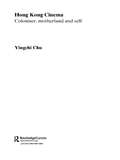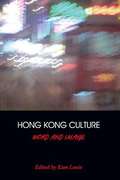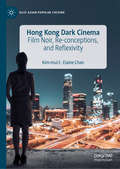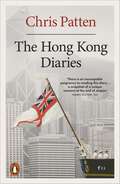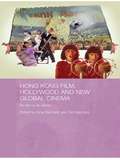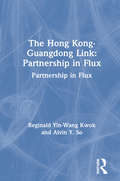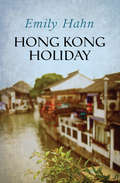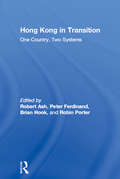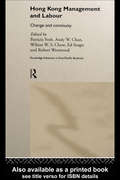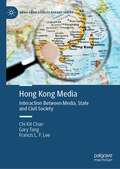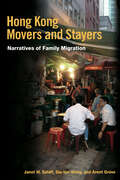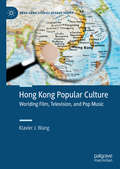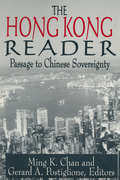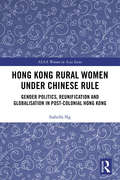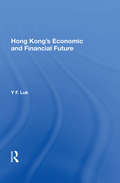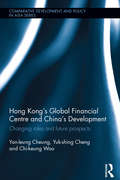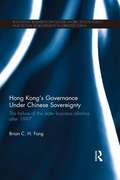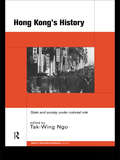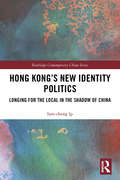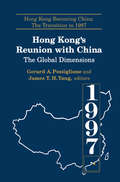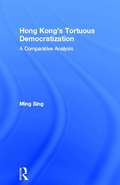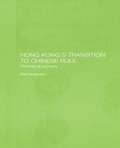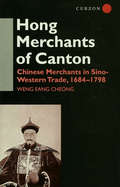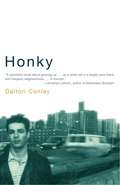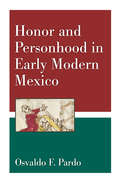- Table View
- List View
Hong Kong Cinema: Coloniser, Motherland and Self
by Yingchi ChuExamining Hong Kong cinema from its inception in 1913 to the end of the colonial era, this work explains the key areas of production, market, film products and critical traditions. Hong Kong Cinema considers the different political formations of Hong Kong's culture as seen through the cinema, and deals with the historical, political, economic and cultural relations between Hong Kong cinema and other Chinese film industries on the mainland, as well as in Taiwan and South-East Asia. Discussion covers the concept of 'national cinema' in the context of Hong Kong's status as a quasi-nation with strong links to both the 'motherland' (China) and the 'coloniser' (Britain), and also argues that Hong Kong cinema is a national cinema only in an incomplete and ambiguous sense.
Hong Kong Culture
by Kam LouieHong Kong as a world city draws on a rich variety of foundational "texts" in film, fiction, architecture and other forms of visual culture. The city has been a cultural fault-line for centuries - a translation space where Chinese-ness is interpreted for "Westerners" and Western-ness is translated for Chinese. Though constantly refreshed by its Chinese roots and global influences, this hub of Cantonese culture has flourished along cosmopolitan lines to build a modern, outward-looking character. Successfully managing this perpetual instability helps make Hong Kong a postmodern stepping-stone city, and helps make its citizens such prosperous and durable survivors in the modern world. This volume of essays engages many fields of cultural achievement. Several pieces discuss the tensions of English, closely associated with a colonial past, yet undeniably the key to Hong Kong's future. Hong Kong provides a vital point of contact, where cultures truly meet and a cosmopolitan traveller can feel at home and leave a sturdy mark. Contributors include John Carroll, Carolyn Cartier, David Clarke, Elaine Ho, Douglas Kerr, Michael Ingham, C. J. W.-L. Wee, Chu Yiu-Wai, Gina Marchetti, Esther M.K. Cheung, Pheng Cheah, Chris Berry, and Giorgio Biancorosso.
Hong Kong Dark Cinema: Film Noir, Re-conceptions, and Reflexivity (East Asian Popular Culture)
by Kim-Mui E. ChanThis book is a scholarly investigation of the historical development and contemporary transformation of film noir in today’s Hong Kong. Focusing on the evolvement of cinematic narratives, aesthetics, and techniques, the author balances a deep reading of the multiple filmic plots with a discussion of the cinematic portrayals of gender, romance, identities and power relations. Nuancing the prototypical cinematic form and tragic sense of classical film noir, the recent Hong Kong cinema turns around the classical generic role of film noir at the turn of the century to convey very different messages—joy, hope or love. This book examines how the mainstream cinema, or pre-and-post-Hong Kong cinema in particular, applies a peculiar strategy that makes rooms for the audience to enjoy a pleasure-giving process of reflexivity and also critique the mainstream ideology. With new analytical approaches and angles, this book breaks new ground in offering transcultural and cross-genre analyses on the cinema and its impact in local and international markets. This book is the first major scholarly investigation of the historical development and contemporary transformation of film noir in today’s Hong Kong. Focusing on the evolvement of cinematic narratives, aesthetics, and techniques, the author balances a deep reading of the multiple filmic plots with a refreshing discussion of the cinematic portrayals of gender, romance, identities and power relations. This book also revisits conceptual categories developed by Foucault, Lacan, Derrida and Butler.
The Hong Kong Diaries
by Chris PattenThe diaries of the last British Governor of Hong Kong, published on the 25th anniversary of the handoverIn June 1992 Chris Patten went to Hong Kong as the last British governor, to try to prepare it not (as other British colonies over the decades) for independence, but for handing back in 1997 to the Chinese, from whom most of its territory had been leased 99 years previously. Over the next five years he kept this diary, which describes in detail how Hong Kong was run as a British colony and what happened as the handover approached. The book gives unprecedented insights into negotiating with the Chinese, about how the institutions of democracy in Hong Kong were (belatedly) strengthened and how Patten sought to ensure that a strong degree of self-government would continue after 1997. Unexpectedly, his opponents included not only the Chinese themselves, but some British businessmen and civil service mandarins upset by Patten's efforts, for whom political freedom and the rule of law in Hong Kong seemed less important than keeping on the right side of Beijing. The book concludes with an account of what has happened in Hong Kong since the handover, a powerful assessment of recent events and Patten's reflections on how to deal with China - then and now.
Hong Kong Film, Hollywood and New Global Cinema: No Film is An Island (Media, Culture and Social Change in Asia)
by Gina Marchetti Tan See KamIn recent years, with the establishment of the Hong Kong Film Archive and growing scholarly interest in the history of Hong Kong cinema, previously neglected historical documents and difficult-to-access films have offered new research materials. As Hong Kong film history comes into sharper focus, its inextricable links across the decades to Southeast Asia, Korea, Japan, the United States, and to the far reaches of the Chinese diaspora have also become more evident. Hong Kong’s connection with Hollywood involves ties that bring together art cinema and popular genres as well as film festivals and the media marketplace with popular transnational genres. Giving fresh and facsinating insights into the vibrant area of Hong Kong, this exciting new book links Hong Kong with world film culture both within and beyond the commercial Hollywood paradigm. It emphasizes Hong Kong film in relation to other cinema industries, including Hollywood, and demonstrates that Hong Kong film, throughout its history, has challenged, redefined, expanded, and exceeded its borders.
The Hong Kong-Guangdong Link: Partnership in Flux (Hong Kong Becoming China Ser.)
by Reginald Yin-Wang Kwok Alvin Y. SoThis text focuses on the relationship of Hong Kong with the adjacent Chinese province Guangdong, the territories most directly involved in the 1997 transfer of Hong Kong to Chinese rule. The socio-economic, political and cultural impact of this crucial link and the implications for the future of both Hong Kong and China are studied. A multi-disciplinary approach is taken to examine the complexity of economic, political and cultural transformation of the Hong Kong-Guangdong link and this book presents a historical perspective to trace the long-term structural transformation. The dynamics of the integration process between the two territories is also explored.
Hong Kong Holiday: China To Me, Hong Kong Holiday, And England To Me
by Emily HahnAuthor of such celebrated and acclaimed works as The Soong Sisters, China to Me, and Fractured Emerald: Ireland, Emily Hahn has been called by the New Yorker &“a forgotten American literary treasure.&” Now Hahn is reintroduced to a new generation of readers, bringing to light her richly textured voice and unique perspective on a world that continues to exist through both history and fiction. In a sense, Hong Kong Holiday is a supplement to Emily Hahn&’s China to Me, marked by the illustrative anecdote and incisive wit that spotlighted the most important incidents of her life during the long months from the Japanese capture of Hong Kong until she was finally returned home on the second voyage of the exchange ship, Gripsholm. Presented here is a crystal-clear picture of the oppressed city—its life in the bazaars, beauty shops, restaurants, and dens. Among the rich and among the poor, in hospitals and in internment camps, Hong Kong Holiday is exotic, intriguing, and all too real.
Hong Kong in Transition: One Country, Two Systems (Routledge Studies in the Modern History of Asia)
by Peter Ferdinand Robin Porter Robert Ash Brian HookHong Kong in Transition offers a perspective on the exceptional constitutional and administrative experiment that has been taking place in Hong Kong, based on a substantial period under Chinese rule. There have been both successes and failures, and a perceptible process of change which is important to document.The particular appeal of this volume lies in the fact that it combines a broad overview with detailed study of individual topics. It is multidisciplinary, and its chapters may be read as 'stand-alone' studies or taken as complementary parts of a whole snapshot of Hong Kong in this critical early period. The chapters are pitched at a level to make them accessible both to undergraduates and to the specialist. Contributors have been drawn from Hong Kong, Macau, the UK, the US, Australia and Germany, reflecting the international interest in the fate of Hong Kong.
Hong Kong Management and Labour: Change and Continuity (Routledge Advances in Asia-Pacific Business #No.9)
by Patricia Fosh Andy W. Chan Wilson W.S. Chow Ed Snape Robert WestwoodHong Kong Management and Labour argues, in a series of previously unpublished, completely up-to-date contributions, that economic and social change has been ongoing in Hong Kong for many years, and political change is perhaps less important for labour and management in the region. This book is written bearing in mind the concerns of policy makers and managers - particularly human resource managers, and those interested in labour relations, trade unions, labour markets and law, and comparative management.
Hong Kong Media: Interaction Between Media, State and Civil Society (Hong Kong Studies Reader Series)
by Chi Kit Chan Gary Tang Francis L. LeeThis book explores the challenges to news professionalism and media autonomy stemming from the state, market pressure, the digitalization of communication, and a polarized civil society in Hong Kong. China is tightening its control over post-handover Hong Kong, which includes press freedom. Harsh market competition, coupled with shifting readership from mainstream media to digital platforms, is squeezing the business viability of media organizations. The polarization of civil society in post-handover Hong Kong had degraded consensual values upon which news professionalism relies. Journalists have had to reorient news professionalism and media power in the midst of state-society tension, market pressure, and the shifting communication mode driven by digitalization. These are the key questions for Hong Kong media. This dynamic intervention will be of interest to journalists, scholars of civil society, and scholars of Asian politics.
Hong Kong Movers and Stayers: Narratives of Family Migration (Studies of World Migrations)
by Janet W. Salaff Siu-lun Wong Arent GreveHalf a million Hong Kong residents fled their homeland during the thirteen years before Hong Kong's reversion to China in 1997. Nearly half of those returned within the next several years. Filled with detailed, first-hand stories of nine Hong Kong families over nearly two decades, Hong Kong Movers and Stayers is a multifaceted yet intimate look at the forces behind Hong Kong families' successful, and failed, efforts at migration and settlement. Defining migration as a process, not a single act of leaving, Hong Kong Movers and Stayers provides an antidote to ethnocentric and simplistic theories by uncovering migration stories as they relate to social structures and social capital. The authors meld survey analysis, personal biography, and sociology and compare multiple families in order to give voice to the interplay of gender, age, and diverse family roles as motivating factors in migration.
Hong Kong Popular Culture: Worlding Film, Television, and Pop Music (Hong Kong Studies Reader Series)
by Klavier J. WangThis book traces the evolution of the Hong Kong’s popular culture, namely film, television and popular music (also known as Cantopop), which is knotted with the city’s geo-political, economic and social transformations. Under various historical contingencies and due to the city’s special geo-politics, these three major popular cultural forms have experienced various worlding processes and have generated border-crossing impact culturally and socially. The worlding processes are greatly associated the city’s nature as a reception and departure port to Sinophone migrants and populations of multiethnic and multicultural. Reaching beyond the “golden age” (1980s) of Hong Kong popular culture and afar from a film-centric cultural narration, this book, delineating from the dawn of the 20th century and following a chronological order, untangles how the nowadays popular “Hong Kong film”, “Hong Kong TV” and “Cantopop” are derived from early-age Sinophone cultural heritage, re-shaped through cross-cultural hybridization and influenced by multiple political forces. Review of archives, existing literatures and corporation documents are supplemented with policy analysis and in-depth interviews to explore the centennial development of Hong Kong popular culture, which is by no means demise but at the juncture of critical transition.
The Hong Kong Reader: Passage to Chinese Sovereignty
by Ming K. Chan Gerard A. PostiglioneThis paperback reader provides the student and general reader with easy access to the major issues of the Hong Kong transition crisis. Contributors include both editors, as well as Frank Ching, Berry F. Hsu, Reginald Yin-wang Kwok, Peter Kwong, Julian Y.M. Leung, Ronald Skeldon, Alvin Y. So, Yun-wing Sung, and James T.H. Tang - the majority of whom live and work in Hong Kong and experience the transition firsthand, personally and professionally.
Hong Kong Rural Women under Chinese Rule: Gender Politics, Reunification and Globalisation in Post-colonial Hong Kong (ASAA Women in Asia Series)
by Isabella NgThis book explores gender dynamics in the indigenous villages (also known as walled villages) in post-handover Hong Kong. It looks at how Hong Kong’s reunification with China has impacted the walled villagers, in particular the women, and how the walled villages’ current gender dynamics in return reflects the changes that have happened in Hong Kong after the reunification with China. It traces the historical development of the walled villages, outlines the nature of walled-village society, and explores the changes currently at work including the erosion of the rural/urban divide, the increasing participation of indigenous women in Hong Kong society more widely and the breakdown of traditional social norms, especially patriarchy.
Hong Kong's Economic And Financial Future
by Y. F. LukSIGNIFICANT ISSUES SERIES papers are written for and published by the Center for Strategic and International Studies. The series will present the insights of prominent East Asian analysts and draw conclusions about complementarities or divergences that may exist. Those insights, in tum, will serve in the aggregate as the basis for a richer, cross-
Hong Kong's Global Financial Centre and China's Development: Changing Roles and Future Prospects (Comparative Development and Policy in Asia)
by Yan-leung Cheung Yuk-shing Cheng Chi-keung WooThis book provides an overview of Hong Kong’s role as an international financial centre, focusing especially on how Hong Kong has contributed significantly, and continues to contribute significantly, to China’s economic development. It considers the importance of Hong Kong’s stock market in raising finance for Chinese companies, explores the potential of Hong Kong as an offshore financial centre, and discusses recent regulatory reforms. It concludes by assessing the prospects for Hong Kong’s continuing success as a global financial centre, and puts forward recommendations for policies which would help secure continuing success.
Hong Kong's Governance Under Chinese Sovereignty: The Failure of the State-Business Alliance after 1997 (Routledge Research on Social Work, Social Policy and Social Development in Greater China)
by Brian C. FongAs a hybrid regime, Hong Kong has been governed by a state-business alliance since the colonial era. However, since the handover in 1997, the transformation of Hong Kong’s political and socio-economic environment has eroded the conditions that supported a viable state-business alliance. This state-business alliance, which was once a solution for Hong Kong’s governance, has now become a political burden, rather than a political asset, to the post-colonial Hong Kong state. This book presents a critical re-examination of the post-1997 governance crisis in Hong Kong under the Tung Chee-hwa and Donald Tsang administrations. It shows that the state-business alliance has failed to function as an organizational machinery for supporting the post-colonial state, and has also served to generate new governance problems. Drawing upon contemporary theories on hybrid regimes and state capacity, this book looks beyond the existing opposition-centered explanations of Hong Kong’s governance crisis. By establishing the causal relationship between the failure of the state-business alliance and the governance crisis facing the post-colonial state, Brian C. H. Fong broadens our understanding of the governance problems and political confrontations in post-colonial Hong Kong. In turn, he posits that although the state-business alliance worked effectively for the colonial state in the past, it is now a major problem for the post-colonial state, and suggests that Hong Kong needs a realignment of a new governing coalition. Hong Kong’s Governance under Chinese Sovereignty will enrich and broaden the existing literature on Hong Kong’s public governance whilst casting new light on the territory’s political developments. As such, it will be welcomed by students and scholars interested in Chinese politics, Hong Kong politics, and governance.
Hong Kong's History: State and Society Under Colonial Rule (Asia's Transformations)
by Tak-Wing NgoRewriting Hong Kong's history from the bottom up, the chapters investigate vital, but hitherto obscured, aspects of the colony's rise. They cover the Chinese collaboration with the colonial regime, legal discrimination and intimidation, rural politics, social movements, government-business relations, industrial policy, flexible manufacturing and colonial historiography. Drawing together contributions from historians, sociologists and political scientists, the book highlights the role played by a variety of social actors in Hong Kong's history and differs both from recent celebrations of British colonialism and anti-colonial Chinese nationalism.
Hong Kong’s New Identity Politics: Longing for the Local in the Shadow of China (Routledge Contemporary China Series)
by Iam-chong IpIp uses Hong Kong as a case study in how the production of the desire for "the local" lies at the heart of global cultural economy. Perhaps more so than most places, the construction of a local identity in Hong Kong has come about through a complex interplay of neoliberalism, postcoloniality and reaction to the consequent anxieties and uncertainties. As its importance as an economic centre has diminished and its relationship with Mainland China has become more strained, its people have become more concerned to define a "Hong Kong" identity that can be defended from external threat. Ip analyses the working and reworking of power relations and modes of agency in this global city. A must read for scholars of Hong Kong politics and society as well as a fascinating case study for scholars of identity politics as a global phenomenon.
Hong Kong's Reunion with China: The Global Dimensions (Hong Kong Becoming China Ser.)
by Gerard A. Postiglione James Tuck-Hong TangThe issues surrounding Hong Kong's global position and international links grow increasingly complex by the day as the process of Hong Kong's transformation from a British colony to a Chinese Special Administration Region unfolds. This volume addresses a number of questions relating to this process. How international is Hong Kong? What are its global and international dimensions? How important are these dimensions to its continued success? How will these dimensions change, especially beyond the sphere of economics? Is Hong Kong's internationalization, defined in terms of its willingness to embrace international values and its capacity to maintain its international presence, at risk? These questions are presented as they pertain to the changing situation; relations between mainland China, Taiwan and Hong Kong; the positions of Australia, Canada and the United States on Hong Kong; internalization of international legal values; Americanization vs. Asianization; linkages to the world through Guangdong; strategies to emigrate overseas, cultural internationalization; media internationalization and universities within the global economy.
Hong Kong's Tortuous Democratization: A Comparative Analysis (Routledge Contemporary China Series #Vol. 2)
by Ming SingThis book raises interesting questions about the process of democratization in Hong Kong. It asks why democracy has been so long delayed when Hong Kong's level of socio-economic development has become so high. It relates democratization in Hong Kong to wider studies of the democratization process elsewhere, and it supplements the received wisdom - that democracy was delayed because of colonial rule and by the opposition of China - with new thinking, for example, that its quasi-bureaucratic authoritarian political structure vested power in bureaucrats who refused to have top-down democratization; a politically weak civil society and a non-participant political culture that crippled bottom-up democratization; plus the division between pro-democratic civil society and political society.
Hong Kong's Transition to Chinese Rule: The Limits of Autonomy
by Ralf HorlemannFollowing the return of Hong Kong to Chinese sovereignty, it appears that the 'high degree of autonomy' promised to Hong Kong is limited in many ways. China's reservations about the development of democracy in Hong Kong lies at the heart of the problem. The conceptual inadequacies set out in the Basic Law, Hong Kong's mini-constitution, show a correlation between a lack of democracy and a loss of autonomy. This book argues that genuine autonomy from the central government in Beijing is impossible without a democratic system in Hong Kong. Developments since the handover have, however, demonstrated that democratic trends have been halted and even reversed and that democracy is not likely to be established in Hong Kong in the near future.
The Hong Merchants of Canton: Chinese Merchants in Sino-Western Trade, 1684-1798 (Nias Monographs In Asian Studies #No. 70)
by Weng Eang CheongThis study eschews the uncritical acceptance of secondary sources that has characterized studies in this field, going back to and reinterpreting previously neglected primary sources, thereby enabling it to chart linkages between the European and Asian trades that have been regarded as parallel but unrelated (or at best competing) activities. In so doing, the work sheds new light on this crucial period.
Honky
by Dalton ConleyThe author recalls how his childhood had all of the classic elements of growing up in America. His entertaining memoir as child, teenager and adult reveals how race and class impact all of us.
Honor And Personhood In Early Modern Mexico
by Osvaldo F. PardoOsvaldo F. Pardo examines the early dissemination of European views on law and justice among Mexico s native peoples. Newly arrived from Spain in the sixteenth and seventeenth centuries, mendicant friars brought not only their faith in the authority of the Catholic Church but also their reverence of the monarchy. Drawing on a rich range of documents dating from this era including secular and ecclesiastical legislation, legal and religious treatises, bilingual catechisms, grammars on indigenous languages, historical accounts, and official reports and correspondence Pardo finds that honor, as well as related notions such as reputation, came to play a central role in shaping the lives and social relations of colonists and indigenous Mexicans alike. Following the application and adaptation of European ideas of justice and royal and religious power as they took hold in the New World, Pardo sheds light on the formation of colonial legalities and long-lasting views, both secular and sacred, that still inform attitudes toward authority in contemporary Mexican society. "
